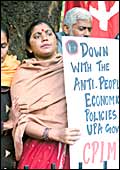 |
| RBI's Reddy: Weak rupee
good for exports, but what about imports? |
The
inter-linked global economy is sometimes a zero sum game. Peter's
loss is Paul's gain; so when us Federal Reserve boss Alan Greenspan
sneezes, RBI Governor Y.V. Reddy catches a cold. Here's how: the
value of the rupee has been falling for sometime now. On October
18, it hit an 11-month low of Rs 45.14 per dollar. The trigger:
trade data showing India's deficit in September ballooning to
$3.19 billion (Rs 14,355 crore) from $2.16 billion (Rs 9,720 crore)
a year earlier.
Yet, the dramatic fall in the currency, especially
over the last month, hasn't created any ripples at all. Says Rajiv
Kumar, Chief Economist at CII: "A combination of benign interest
rates and a weak rupee is good for the economy.'' Official circles
also believe that the fall is actually a "correction''. Just
three years ago, the dollar was trading at Rs 49, a consequence
of the greenback falling against the euro and the yen. With the
dollar appreciating against these currencies once more, the rupee
had to weaken.
This yawning trade gap could have been cushioned
somewhat by higher inflows from FIIs (foreign institutional investors)
but that did not happen; in fact, they pulled out a net amount
of $150 million (Rs 675 crore) till October 20, in sharp contrast
to the January-September period when they invested a net amount
of $8.5 billion (Rs 38,250 crore), equal to their purchases for
all of 2004. The pullout is directly linked to the Federal Reserve
raising interest rates from 1 per cent levels a year ago to 3.5
per cent now.
Reddy's running nose, however, is bringing
great joy to exporters, especially to the booming information
technology and ITEs sectors, who had been hit by the appreciating
rupee over the preceding three years. Says Rafeeq Ahmed, former
president, Federation of Indian Exports Organisation: "It's
only fair as exporters have had to absorb the losses from the
appreciating rupee." Adds Sachin Taneja, VP, Mecklai Financials,
a foreign exchange broker: "It seems the RBI is letting the
rupee fall in order to shore up India's export competitiveness."
After all, Japan and China have raised this strategy of keeping
their currency valuations low to an art form.
However, importers, of which the government
is the largest, will now be presented with higher tabs for goods
purchased abroad. So, we're back to the zero sum game. But we'll
deal with that in another story.
-Ashish Gupta
A Break From Strikes?
The amended Contract Labour Act could lead
to rapid employment generation in the country.
 |
| Red flag: Or dawn of reason? |
The
rhetoric was abrasive and combative, but the fine print indicated
an incipient dawn of reason. Following a crucial politburo meeting
on October 25, CPI(M) General Secretary Prakash Karat announced
that his party "would consider allowing certain it companies
and BPOs to function undisrupted as they are linked to essential
services". However, in a crumb to the ideological dinosaurs
in his party, he has defended the right of employees in these
sectors to form unions and carry out collective bargaining.
This concession is critical to the future
of the Indian economy. The Ministry of Labour is working on amendments
to the Contract Labour (Regulation and Abolition) Act, 1970, to
exempt sectors such as transport, construction and maintenance,
EOUs, SEZs, hospitals and the it and ITEs from its purview. Implication:
once enacted, these sectors will be allowed to freely hire contract
workers. Currently, some of these industries do employ contract
workers, but the ministry has the power to prohibit such employment
through an official notification. The government proposes to relinquish
this right under the proposed amendment. An official note circulated
by the Ministry of Labour says: "Despite the existence of
the Contract Labour Act, the emerging reality in workplaces is
increasing the use of contract labour. It is important that this
reality be recognised and appropriate formalisation of this ground
reality be made in the existing legal framework."
Experts say the amendment will remove a major
roadblock to rapid employment generation in the country. But will
the Marxists allow this? We can only pray for the best.
-Ashish Gupta
Quid Pro Quo
India is pulling out all stops to secure access
to the West for its professionals.
The
government is going full steam ahead with service sector negotiations
at the World Trade Organization. "Our revised proposal is
a bold and conditional offer," says Nagesh Kumar, Director-General,
Research and Information Systems for the Non-Aligned and Other
Developing Countries, a government think tank. India has offered
to open up a host of new sectors and sub sectors (see India's
Revised Offer On Services), provided the developed countries,
especially the US and the EU, make concessions on Mode IV (Free
Movement of Professionals Under The General Agreement On Tariffs
and Trade). On offer is increased access for providers of architectural
services, veterinary services, construction and related activities
and life insurance services from the developed world.
| INDIA'S REVISED OFFER ON SERVICES |
|
|
| Commerce
Minister Nath: He's made
his move |
» Allow
foreign architecture firms entry into India
» Allow
foreign firms entry into research and developmental activities
» Allow
foreign firms entry into real-estate services
» Business
visitors and contractual service suppliers will be treated
as professionals
» Foreign
firms allowed entry into non-banking financial services |
The revised offer was made by Indian Commerce
Minister Kamal Nath at a meeting of the Ministerial Core Group
on Services in Geneva in the second week of October, which was
attended by Argentina, Brazil, Canada, Korea, Mexico, Singapore
and seven other countries. Nath also substantially improved upon
India's existing commitments in a number of other sectors such
as engineering and computer-related services, research and development
services.
On the issue of Mode IV, the revised offer
includes all categories of natural persons such as intra-corporate
transferees, business visitors, contractual service suppliers
and independent professionals. A revised offer is critical from
India's point of view as there is currently no differentiation
between temporary movement of labour and immigration. Developed
nations restrict the movement of professionals by imposing strict,
and often unnecessary, eligibility conditions for visa and work
permit applications and by limiting the length of stay and conditions
relating to transferability of employment. These restrictions
raise the cost of entering these markets as service providers
by eroding the cost advantage of Indian companies.
The government is now waiting to see what
kind of counter-offers the West makes.
- Ashish Gupta
|






